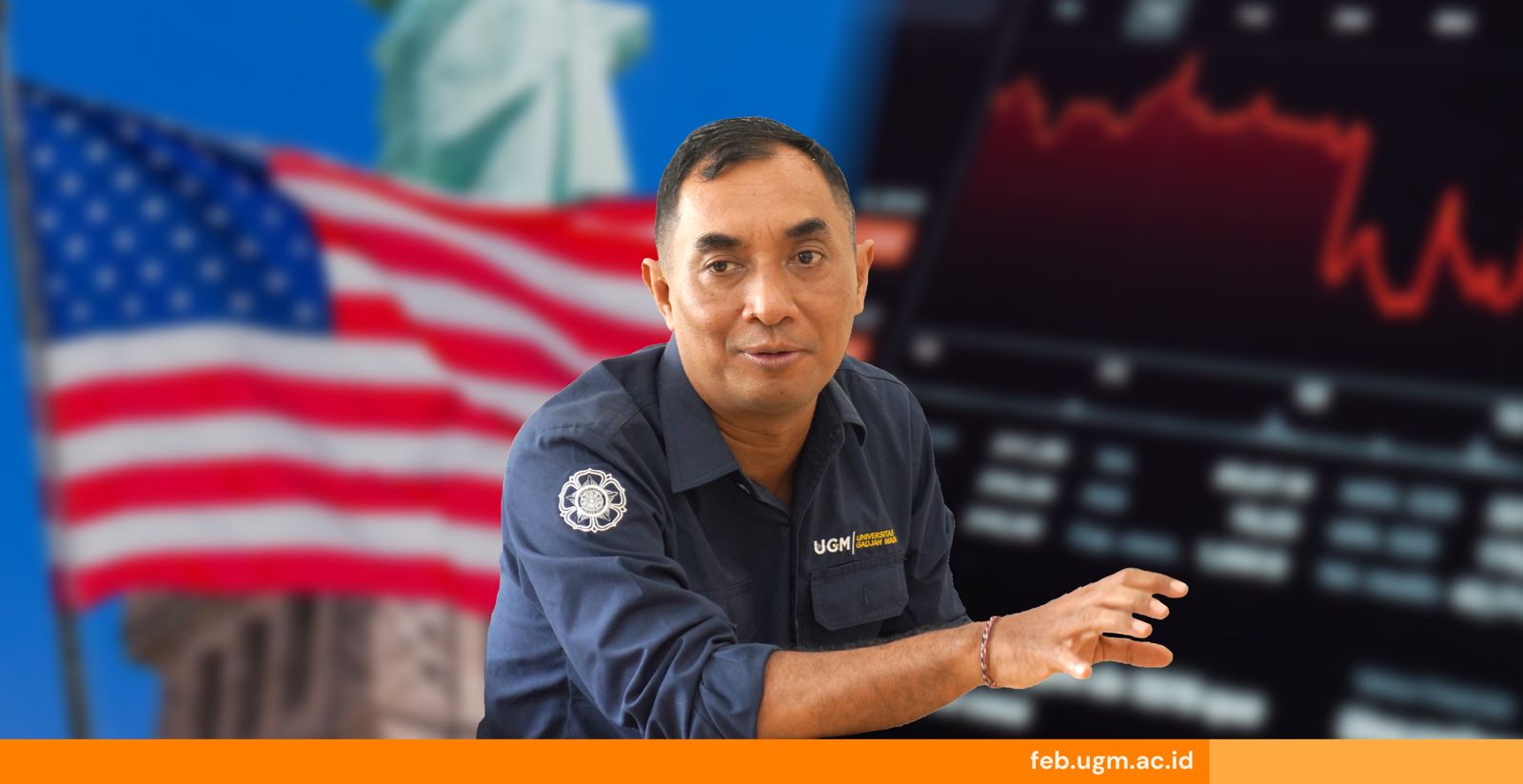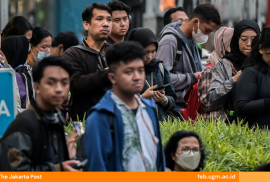
Global economic turmoil has once again shaken Indonesia’s financial markets. The new import tariff policy announced by the United States has raised concerns among investors and put pressure on the Jakarta Composite Index (JCI). Trade wars and geopolitical tensions increasingly impact the capital market, the real sector, and national economic stability.
To understand this situation, the FEB UGM Public Relations team interviewed UGM Investment, Finance, and Banking Expert and Head of the Management Study Program of FEB UGM, I Wayan Nuka Lantara, Ph.D. The following are excerpts from the interview with I Wayan Nuka Lantara on Wednesday, April 16, 2025.
1. Can you explain the leading cause of the decline in the JCI after the new US import tariff policy was implemented?
Stock market movements are always dynamic. No stock goes up forever, and no stock goes down forever. When there is panic, such as panic selling, stock prices can fall dramatically. But when people realize that the panic is a form of overreaction, the market slowly returns to rationality. At this point, investors see an opportunity and start buying stocks that have fallen too low, so demand increases and prices rise.
Global geopolitical dynamics also influence this situation. When Trump unilaterally announced the tariff hike, many countries reacted, including China, which chose to fight back frontally. Gradually, however, there were compromises and meetings between the adversarial parties, and the market atmosphere started to calm down, although it was not entirely optimistic.
On the other hand, several countries, including Indonesia, also made policy adjustments such as renegotiating and mapping import and export portfolios that are more favorable to both parties. This signals that the initially pessimistic global conditions are beginning to improve, although not fully stabilized.
2. How has the Indonesian financial market responded to these policies? Are there signs of recovery?
Indonesia’s financial market reaction to the tariff policy is still unstable in the short term. So far, no policy or stimulus is strong enough to create a sustainable positive sentiment. The balance of payments is in deficit, debt maturities are approaching, and a wave of layoffs is beginning in various sectors. So far, there has been no major policy that can cause the market to move consistently in a positive direction.
3. What is the impact of US policies on the Indonesian economy, and which sectors or industries are most affected by US import tariff policies?
The US tariff policy directly impacts several vital sectors of the Indonesian economy, particularly the commodity export sectors such as mining and agriculture. When the price of commodities such as coal falls due to a decline in global demand, government revenue from export taxes also falls. The impact is not only on government revenue but also on gross domestic product (GDP). In addition, the weakening of the rupiah against the US dollar increases the cost of imports, raising production costs and reducing corporate profitability. Sectors highly dependent on imported raw materials are also feeling the pressure.
4. In your opinion, is the weakening of the JCI a temporary dip, or does it have the potential to persist over a more extended period?
Looking at the situation, the weakening of the JCI is not temporary. Unless there is an improvement in fundamentals and policies that can boost market confidence, the volatile trend will continue. This situation has the potential to last longer if global trade tensions do not subside and there are no genuine efforts to create stability from within.
5. How does this policy affect domestic and foreign investor sentiment?
This policy has also affected investor sentiment, both domestic and foreign. Many investors are taking a wait-and-see attitude due to the high level of uncertainty. Foreign investors, in particular, still tend to sell rather than buy, as reflected in the net selling data in the stock market. This negative sentiment has also slowed trading and led investors to adopt a more conservative—even pessimistic—stance on the short-term outlook.
6. What are the medium to long-term risks should the government and market participants be aware of?
In the medium to long term, risks that should be anticipated include the volatility of the rupiah exchange rate, increased production costs, and the swelling foreign debt burden due to the weakening rupiah. Companies that rely on imported materials or have dollar-denominated debt will be the most vulnerable. In addition, if this situation continues, it could lead to serious social consequences, such as rising unemployment and increased social instability—threats that must be addressed proactively.
7. What mitigating measures can retail and institutional investors take in light of these conditions?
Retail and institutional investors need to take appropriate risk mitigation measures to cope with these conditions. The main strategies are portfolio diversification, sound risk management, and careful fundamental analysis. Investors should also be able to control themselves to avoid being easily swayed by momentary panic and stick to rational long-term investment goals.
8. How do you think the government should respond to this policy? Does it need trade diplomacy or some stimulus?
The government should respond to this tariff policy with a trade diplomacy approach. Given that Indonesia does not have the economic power of a superpower like China, the most strategic step is the approach through the negotiating table. In addition, the government also needs to rebalance trading partners and stimulate affected sectors, including expanding market access to untapped countries such as Africa or South Asia.
9. Are there new opportunities for Indonesia in this context? For example, strengthening the domestic market or establishing new trade partnerships?
Amid these global pressures, Indonesia has an opportunity to strengthen the domestic market. If local products can be absorbed by the community and supported by adequate purchasing power, the domestic market can be an alternative economic savior. In addition, opening new partnerships and developing value-added products can also be a strategic step to reduce dependence on traditional markets that are under pressure.
10. As a financial expert and academician, what is your message to the general public who are still unfamiliar with how to deal with such market fluctuations?
In conclusion, for the general public who are not too familiar with market dynamics, it is essential to remain calm and rational. In this uncertain economic climate, people are encouraged to hold on to their current jobs, manage their finances wisely, and avoid unnecessary expenses. The government should also be more active in creating new jobs and supporting the affected communities to prevent worse social and economic effects.
Report: Shofi Hawa Anjani
Editor: Kurnia Ekaptiningrum
Sustainable Development Goals











